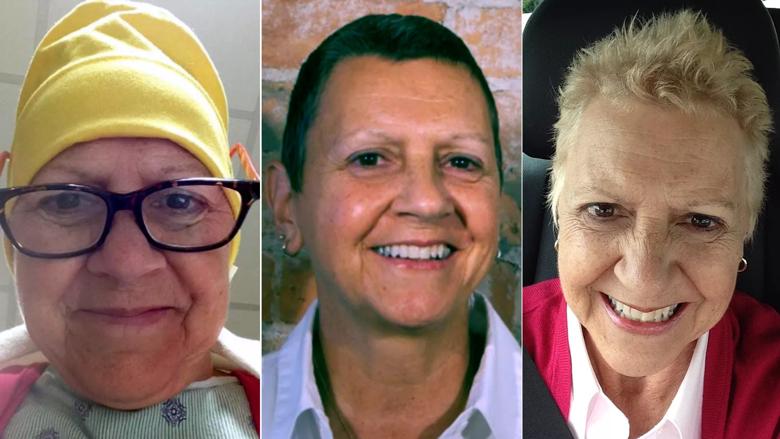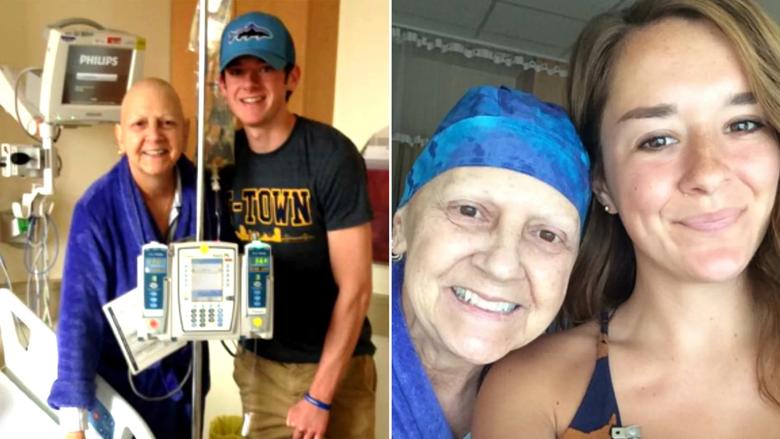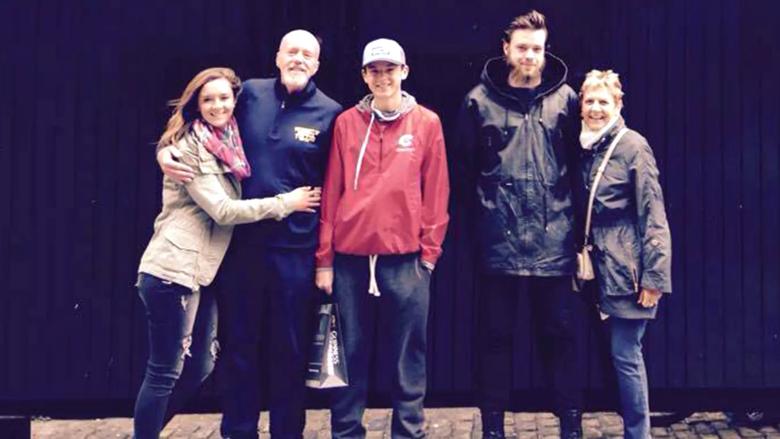Mary Beth Zolik underwent (CAR) T cell therapy at Cleveland Clinic to treat lymphoma
Cleveland Clinic News Service | 216.444.0141
We’re available to shoot custom interviews & b-roll for media outlets upon request.
CCNS health and medical content is consumer-friendly, professional broadcast quality (available in HD), and available to media outlets each day.

Six days after her treatment with an experimental cancer therapy at Cleveland Clinic, Mary Beth Zolik was downhearted.
“At first, I felt nothing. No side effects. Just nothing,” says Mary Beth, 63, retired from a 40-year career as a legendary Toledo radio host. “It was a low point.”
One month after her treatment, the cancer — the most common form of non-Hodgkin lymphoma – was gone. All of it.
And now, 12 months later, she plans to spend the holidays with family and friends by a cozy fire in a seaside Rhode Island beach house, celebrating one full year without the cancer she has valiantly fought since 2012.
“We’ll be going there with great joy in our hearts,” Mary Beth exclaims. “There is so much to celebrate. Sometimes, I can’t believe how my life has changed.”

Image content: This image is available to view online.
View image online (https://assets.clevelandclinic.org/transform/22733609-94c5-4500-9fbd-34731bdc491b/mary-beth-cart-cell-new-tease-12062017_jpg)
Mary Beth during treatment, when her hair grew back, and when she went blonde in June 2017 to celebrate a clean PET scan.
Mary Beth’s cancer is in complete remission following participation in a multicenter clinical trial of a cell-based gene therapy to treat adults with certain types of large B-cell lymphoma who have not responded to or who have relapsed after at least two other kinds of treatment.
The breakthrough chimeric antigen receptor (CAR) T cell therapy has since become the second gene therapy approved by the U.S. Food and Drug Administration (FDA) and the first approved for certain types of non-Hodgkin lymphoma.
One month after her treatment, the cancer — the most common form of non-Hodgkin lymphoma – was gone. All of it. https://t.co/JRUIl1zT1A pic.twitter.com/080X2kYku2
— ClevelandClinicNews (@CleClinicNews) March 19, 2018
RELATED: Baby with Rare Disease Goes Home after Successful Bone Marrow Transplant
According to Mary Beth’s medical oncologist, Dr. Brian Hill of Cleveland Clinic Cancer Center , the customized treatment is a cancer medicine made from the patient’s own white blood cells to stimulate the immune system to help fight the lymphoma.
“Historically, patients like Mary Beth with this form of cancer had very few options for curative therapy if a stem cell transplant didn’t work,” explains Dr. Hill. “She was an ideal candidate for the clinical trial, and had a great response – all detectable areas of cancer have disappeared.”
When diagnosed in 2012, Mary Beth underwent successful chemotherapy treatment. But her remission only lasted a few years, and her large B-cell lymphoma returned. When a stem cell transplant – a way of delivering high-dose chemotherapy – failed to work, Mary Beth urged her Toledo physician to explore clinical trials she had read about in researching her form of cancer.

Image content: This image is available to view online.
View image online (https://assets.clevelandclinic.org/transform/7f7b564c-8daf-4f24-b82d-441a09b91776/mary-beth-kids-12042017_jpg)
Mary Beth during treatment, when her hair grew back, and when she went blonde in June 2017 to celebrate a clean PET scan.
And that effort, combined with her own diligence in finding another treatment option, led her to the Cleveland Clinic and Dr. Hill. She recalls the process of applying for and being evaluated for the clinical trial as nerve wracking, like awaiting the results of a final exam in college: “You have to be sick, but not too sick. You can’t have an infection. A lot of things can derail you.”
RELATED: Cooling Cap Helps Mom Go Through Chemotherapy Without Losing Hair
Once accepted for the trial at the Cleveland Clinic, Mary Beth first underwent a procedure to collect white blood cells from her body. They were then shipped to California, where they were genetically modified in a laboratory with the receptor that would enable her body to recognize and fight the cancer.
While this process was taking place, Mary Beth underwent a few days of chemotherapy to condition her immune system to better accept the modified cells, which were ultimately transplanted back into her body. While she did eventually experience a temporary side effect – a neurologic toxicity that left her in a confused state for about 36 hours – the treatment worked perfectly.

Image content: This image is available to view online.
View image online (https://assets.clevelandclinic.org/transform/9e12f5a6-a34e-4583-96f7-fb0f8681e26a/mary-beth-family-12042017_jpg)
Mary Beth during treatment, when her hair grew back, and when she went blonde in June 2017 to celebrate a clean PET scan.
Mary Beth was among the 51 percent of patients treated in the clinical trial to experience complete remission – something she knows wouldn’t have occurred if she hadn’t sought out and found a clinical trial.
RELATED: Innovative Procedure Helps Women Preserve Fertility Even With Chemotherapy
“A year ago, I didn’t know if I’d still be alive today,” Mary Beth adds. “It shows the importance of being an advocate for yourself.”
NOTE: The treatment mentioned in this article — YESCARTA™, from Kite Pharma Inc. – was approved by the U.S. Food and Drug Administration in October. Read the results of the clinical trial of this CAR T cell therapy treatment in the Dec. 10 issue of the New England Journal of Medicine. Dr. Hill is co-author on the paper.
Cleveland Clinic is a nonprofit multispecialty academic medical center that integrates clinical and hospital care with research and education. Located in Cleveland, Ohio, it was founded in 1921 by four renowned physicians with a vision of providing outstanding patient care based upon the principles of cooperation, compassion and innovation. Cleveland Clinic has pioneered many medical breakthroughs, including coronary artery bypass surgery and the first face transplant in the United States. Cleveland Clinic is consistently recognized in the U.S. and throughout the world for its expertise and care. Among Cleveland Clinic’s 82,600 employees worldwide are more than 5,786 salaried physicians and researchers, and 20,700 registered nurses and advanced practice providers, representing 140 medical specialties and subspecialties. Cleveland Clinic is a 6,728-bed health system that includes a 173-acre main campus near downtown Cleveland, 23 hospitals, 280 outpatient facilities, including locations in northeast Ohio; Florida; Las Vegas, Nevada; Toronto, Canada; Abu Dhabi, UAE; and London, England. In 2024, there were 15.7 million outpatient encounters, 333,000 hospital admissions and observations, and 320,000 surgeries and procedures throughout Cleveland Clinic’s health system. Patients came for treatment from every state and 112 countries. Visit us at clevelandclinic.org. Follow us at x.com/CleClinicNews. News and resources are available at newsroom.clevelandclinic.org.
Editor’s Note: Cleveland Clinic News Service is available to provide broadcast-quality interviews and B-roll upon request.